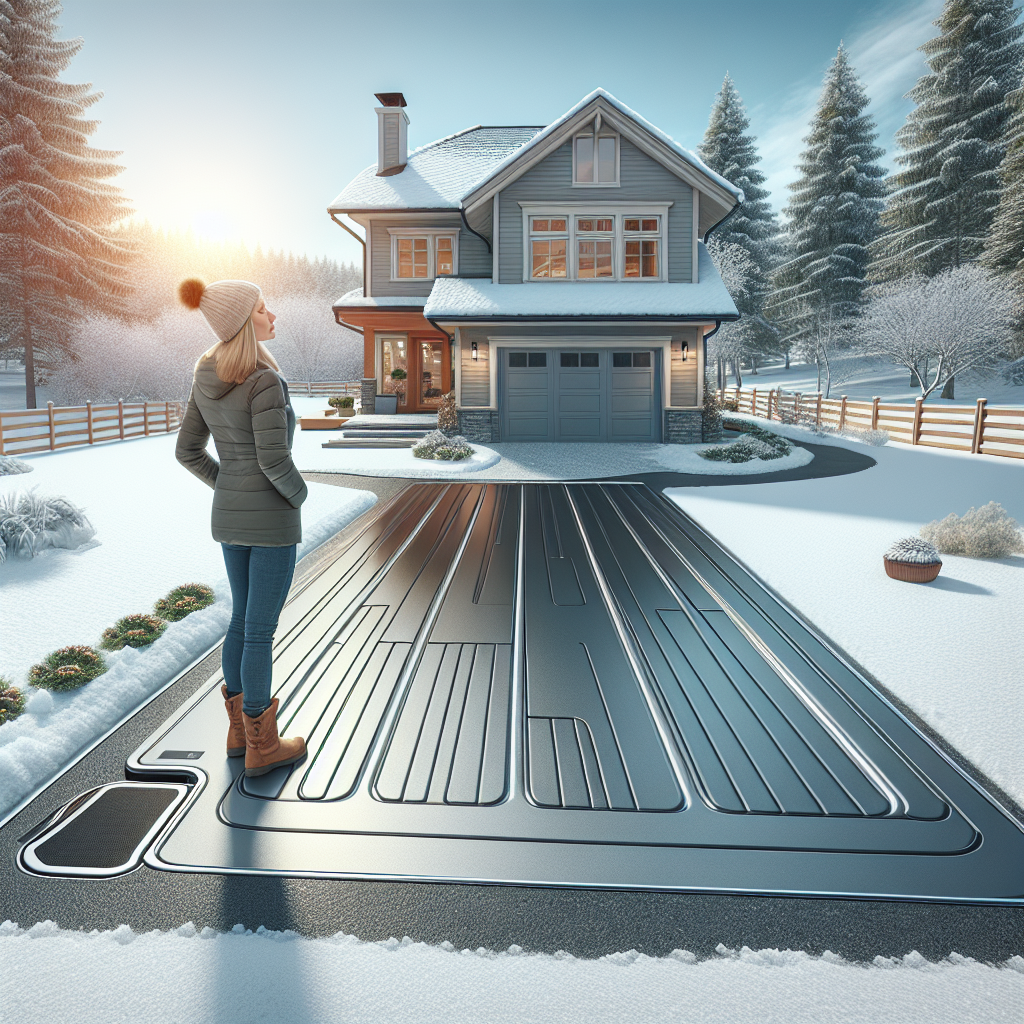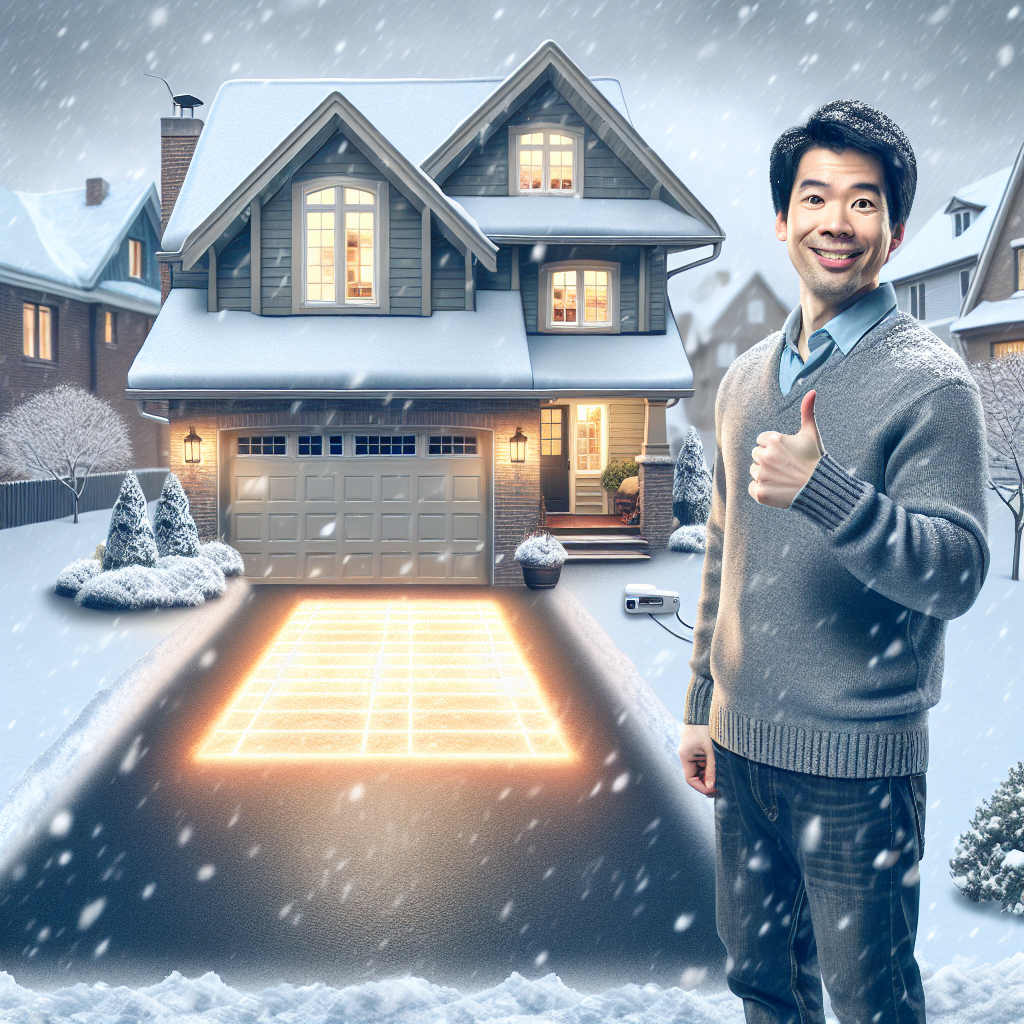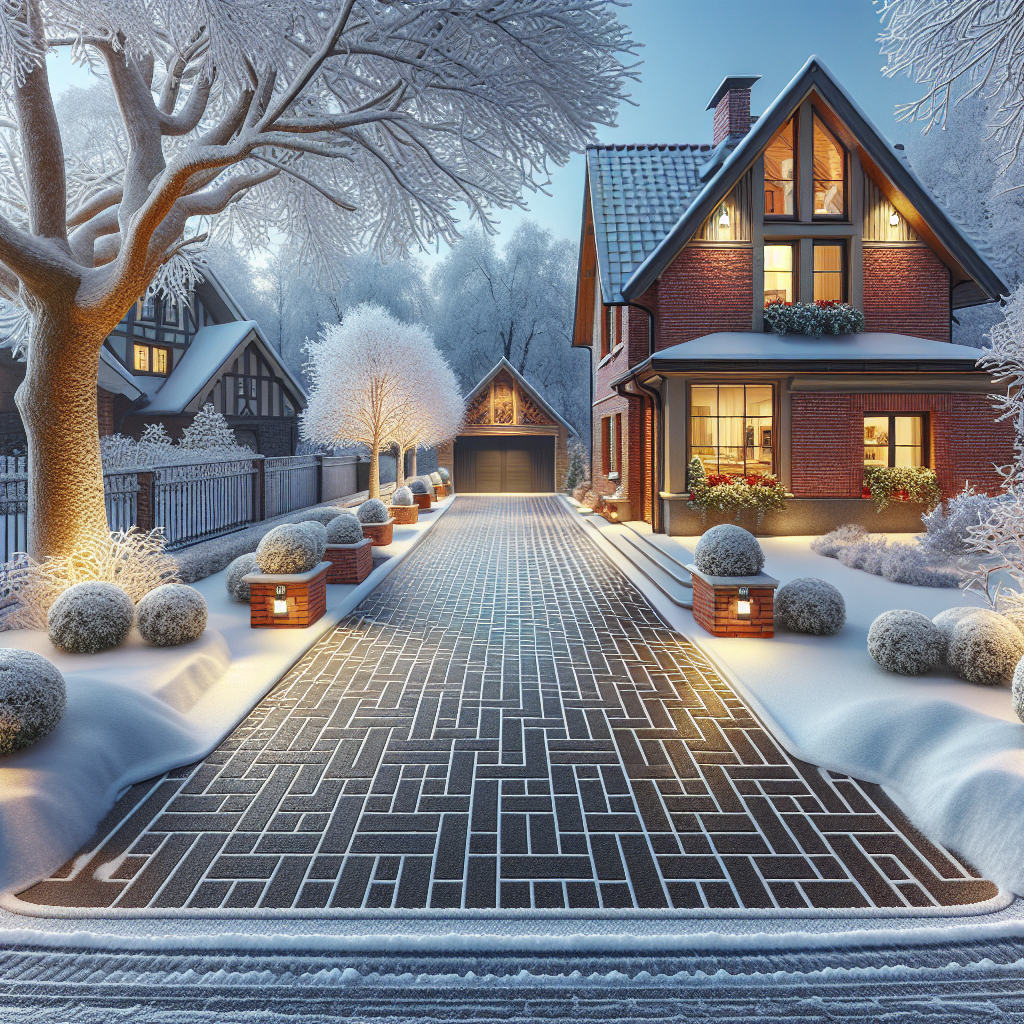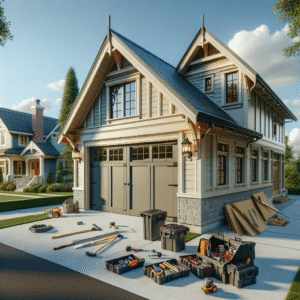What is a Heated Driveway? Exploring its Functionality and Types
As winter approaches, the thought of shoveling snow off your driveway might seem daunting. But what if your driveway could take care of the snow itself? Enter the heated driveway, a game-changing solution that melts snow and ice automatically, ensuring your driveway is clear and safe without the need for physical exertion. A heated driveway system incorporates heating elements beneath the driveway surface, which can be activated to melt snow as it falls, thereby preventing accumulation and the hazards associated with icy surfaces.
5 Key Benefits of Installing a Heated Driveway in Your Home
Considering installing a heated driveway? Here are five compelling reasons why this investment is worth considering:
- Safety: Reduces the risk of accidents due to slippery conditions.
- Convenience: Eliminates the need for physical snow removal.
- Property Value: Increases your home’s marketability and value.
- Efficiency: Offers automatic snow removal and requires minimal maintenance.
- Longevity: Helps to protect the driveway material from freeze-thaw cycles that can cause cracking and damage over time.
How to Choose the Right Heated Driveway System: Tips and Considerations
Selecting the right heated driveway system involves understanding your specific needs and the unique characteristics of your property. From evaluating the types of heating systems—such as electric coil systems versus hydronic systems—to considering installation costs and energy efficiency, making an informed decision is crucial. Consulting with a local expert can provide personalized insights and recommendations, ensuring that your heated driveway performs optimally for your particular environment.

If you’re ready to take your home improvement or construction project to the next level, we can help! Find trusted contractors on BuildNet, whether you’re looking for renovations, new builds, electrical work, plumbing, or anything in between. Our directory connects you with qualified professionals who can make your vision a reality.
What is a Heated Driveway? Exploring its Functionality and Types
Imagine a chilly winter morning, snow is falling softly, and you’re snug in your warm bed. The last thing you want to think about is shoveling snow off your driveway. Enter the heated driveway – a modern convenience that not only enhances comfort but also adds value to your home. Let’s dive into what a heated driveway is, how it functions, and the various types available on the market.
Understanding Heated Driveways
Simply put, a heated driveway is a system designed to melt snow and ice on your driveway, ensuring it’s clear and safe to use without the need for physical labor or harsh chemicals. This innovative system can be a game-changer for those residing in snow-prone areas.
How Does a Heated Driveway Work?
Heated driveways operate through either an electric system or a hydronic system. Both systems involve the installation of heating elements beneath the driveway surface. When activated, these elements heat up the surface above, efficiently melting any snow or ice.
Electric Heated Driveways
Electric systems use heat cables or mats that are installed under the driveway’s surface. When electricity passes through these cables, they heat up and, in turn, warm the surface of the driveway. One of the advantages of electric heated driveways is their simplicity in installation and maintenance. They’re often seen as less invasive and can be more cost-effective in terms of installation.
Hydronic Heated Driveways
Hydronic systems, on the other hand, circulate a glycol solution or water through a series of pipes installed beneath the driveway. A boiler heats the liquid, which is then pumped through these pipes, creating a warm surface that melts snow and ice. Hydronic systems are often praised for their efficiency and can be integrated into a home’s existing heating system.
Types of Heated Driveways
When considering a heated driveway, you can choose between two installation methods:
- Full Driveway Heating: This method involves heating the entire driveway surface. It’s ideal for properties where snowfall is heavy and frequent, ensuring complete accessibility, regardless of weather conditions.
- Spot Heating: For those who experience less frequent snowfall or have budget constraints, spot heating can be a viable option. This involves heating only critical areas of the driveway, such as inclines or walking paths, reducing overall installation and operational costs.
Both types of heated driveways can be customized to fit different driveway shapes, sizes, and materials, ensuring effectiveness and efficiency.
Choosing Between Electric and Hydronic Heated Driveways
Deciding between an electric and a hydronic heated driveway often boils down to specific needs, climate conditions, and budget:
Climate Considerations
In areas with harsher winters and heavier snowfalls, a hydronic system may be more beneficial due to its efficiency in larger areas. For milder climates, or for those who only need occasional snow melting, an electric system might suffice.
Cost Implications
Initial installation costs for hydronic systems are generally higher due to the complexity of the setup. However, they can be more cost-effective in the long run, especially if integrated with a home’s heating system. Electric systems, while cheaper to install, might lead to higher electricity bills, especially during peak winter months.
Maintenance Needs
Electric heated driveways usually require less maintenance than hydronic systems, which might need periodic checks on boilers and fluid levels. However, maintenance for both systems is generally minimal, making them a convenient option for many homeowners.
Selecting the right type of heated driveway involves an understanding of your local climate, your specific driveway needs, and how much you’re willing to invest initially versus over time. Consulting with a local contracting expert can provide insights tailored to your home and region, ensuring you make the best choice for your circumstances.
Final Thoughts
Investing in a heated driveway can transform your winter experience from daunting to delightful. No more early morning shoveling or worrying about the safety of your driveway. With the right system in place, you can enjoy a clear, ice-free driveway all winter long. So, whether you decide on an electric or hydronic system, consider how a heated driveway can make your winters safer and your mornings smoother. Remember, consulting with a professional can help you navigate the specifics, ensuring that your heated driveway is a worthwhile addition to your home.

5 Key Benefits of Installing a Heated Driveway in Your Home
As winter approaches, the idea of shoveling snow and dealing with icy driveways can be daunting. Fortunately, technology offers a cozy solution: heated driveways. While the concept might seem like a luxury, the benefits of installing a heated driveway at your home go beyond just comfort. Let’s dive into five compelling reasons why this upgrade can be a game-changer for your property and lifestyle.
1. Say Goodbye to Manual Snow Removal
One of the most immediate benefits of a heated driveway is the elimination of manual snow removal. If you live in an area with heavy snowfall, you know how tedious and physically demanding shoveling can be. A heated driveway uses either electrical coils or hydronic tubes to melt snow and ice automatically, ensuring your driveway is clear without lifting a finger. This not only saves time but also reduces the physical strain associated with snow removal.
- Reduced Injury Risk: Shoveling snow is a common cause of winter injuries, from back strains to slips. A heated driveway minimizes these risks.
- Convenience: Imagine never having to set your alarm early to clear the driveway before work. Your heated driveway takes care of it while you sip your morning coffee.
2. Increase Property Value and Appeal
Installing a heated driveway can enhance the curb appeal and value of your home. It’s a feature that sets your property apart from others in the neighborhood, potentially boosting its marketability and sale price. Homebuyers in snowy regions might be particularly attracted to homes with heated driveways for the convenience and safety they offer.
- Attractive Selling Point: When it comes time to sell, a heated driveway can be a standout feature in your real estate listing, attracting more buyers and possibly speeding up the sale process.
- Aesthetic Maintenance: A heated driveway keeps itself clear, preserving the aesthetic appeal of your home’s exterior during the winter months.
3. Longer Driveway Lifespan
Heated driveways can actually contribute to a longer lifespan for your driveway. The frequent freeze-thaw cycles that occur in winter can cause cracks and damage to your driveway’s surface. By preventing ice and snow accumulation, heated driveways reduce these cycles and the associated wear and tear.
- Reduced Salt and Chemical Use: Unlike traditional snow removal, heated driveways eliminate the need for corrosive de-icing chemicals or salt, which can degrade asphalt and concrete over time.
- Maintenance Savings: Over time, the reduced physical damage to your driveway can save you money on repairs and resurfacing.
4. Enhanced Safety
Safety is paramount, and a heated driveway enhances safety by preventing the accumulation of ice and snow, which are common causes of slips and falls. This feature is particularly beneficial for homes with elderly residents or those with mobility issues.
- Peace of Mind: Knowing that your driveway is clear and safe can reduce anxiety during the winter months, especially when expecting visitors or deliveries.
- All Family Members: From kids to seniors, everyone benefits from a safer walking surface during icy conditions.
5. Saves Time and Money in the Long Run
While the initial installation of a heated driveway system might seem pricey, it can actually save you money in the long term. The costs associated with snow removal services, equipment maintenance, and driveway repairs due to weather-related damage can add up over time. Additionally, the convenience and time saved by not having to manually clear snow or wait for a plow service can be invaluable.
- Reduced Dependence on Snow Removal Services: If you typically hire snow removal services, a heated driveway can significantly cut down on these seasonal expenses.
- Energy Efficient Options: Modern heated driveway systems are designed to be energy-efficient, minimizing the impact on your electricity bills during the colder months.
As we’ve seen, the benefits of installing a heated driveway extend far beyond mere convenience. From enhancing your home’s safety and aesthetic to potentially boosting its market value, the advantages make a compelling case. If you’re considering this upgrade, the winter season might just be a little warmer and a lot easier. Remember, contacting a local expert in heated driveway systems can provide tailored advice and installation services, ensuring your driveway is ready to face the winter with ease.
How to Choose the Right Heated Driveway System: Tips and Considerations
Hey there! If you’re thinking about installing a heated driveway, you’ve probably had your fair share of winter driveway woes. Whether it’s shoveling snow at the crack of dawn or dealing with slippery ice patches, a heated driveway can be a game-changer. But, choosing the right system can feel as tricky as navigating a snowy road. Don’t worry, I’m here to guide you through the icy waters of selecting the perfect heated driveway system for your home.
Understand the Types of Heated Driveway Systems
First things first, let’s talk about the two main types of heated driveways: electric and hydronic. Electric systems use electric cables or mats to generate heat, while hydronic systems pump heated water through pipes. Each has its perks. Electric systems are generally easier and cheaper to install, making them ideal for smaller areas or retrofits. On the other hand, hydronic systems can be more cost-effective in the long run, especially for larger driveways or if you’re building a new home.
Assess Your Driveway’s Needs
Not all driveways are created equal. Your driveway’s size, shape, and material play a pivotal role in deciding which heated driveway system suits you best. A sprawling, winding driveway might benefit more from a hydronic system, while a smaller, straight driveway could be a perfect fit for an electric system. Also, consider the material—concrete, asphalt, and pavers each respond differently to heat, so choose a system that works well with your driveway’s material.
Consider Your Climate
Your local climate is a crucial factor. If you live in an area with mild winters, a less robust system might suffice. However, for those in regions where Jack Frost is a regular visitor, a system that can handle heavy snowfall and lower temperatures is a must.
Energy Efficiency and Costs
Efficiency is key, not just for the environment, but for your wallet too. Electric systems tend to heat up quickly and can be turned on and off as needed, which is great for saving energy. However, if electricity costs are high in your area, a hydronic system might be more economical over time. Consider installation costs as well; hydronic systems might have higher upfront costs but generally have lower operational costs.
Installation Complexity
Who’s doing the heavy lifting? If you’re a DIY enthusiast, an electric system might be more up your alley, as it’s generally simpler to install. Hydronic systems often require professional installation due to their complexity, especially with the plumbing involved. However, investing in professional installation can ensure your system runs efficiently and lasts longer, potentially saving you money and headaches down the line.
Longevity and Maintenance
Think long-term. How much maintenance are you willing to do? Electric systems are pretty low-maintenance once installed. Hydronic systems, while also low in day-to-day maintenance, may require occasional checks on their boilers and pumps. Before making a decision, consider how much time and money you are prepared to invest in upkeep.
Control Systems and Features
Control is crucial. Modern heated driveways come equipped with sensors and timers that help manage when the system turns on and off. This not only helps in conserving energy but also ensures that your driveway is clear when you need it to be. Some systems even allow remote control through smartphone apps, offering ultimate convenience. Go for a system that aligns with your need for control and convenience.
Local Building Codes and Regulations
Last but certainly not least, check your local building codes and regulations. Some areas have specific requirements or restrictions for installing heated driveway systems. It’s also a good idea to touch base with a local contractor who can provide insights into what systems work best in your area and what permits might be necessary.
Choosing the right heated driveway system isn’t just about staying slip-free during winter. It’s about making a smart investment that enhances your property and lifestyle. By considering the type of system, your specific needs, and the local climate, you can select a system that offers peace of mind, efficiency, and convenience. Here’s to a warmer welcome home, no matter how cold it gets outside!

What is a Heated Driveway?
A heated driveway is a type of surface system designed to melt snow and ice, preventing accumulation during cold weather. It utilizes either electric coils or hydronic tubes beneath the driveway’s surface to generate heat and promote snow melting. This technology ensures a clear and safe pathway without the need for manual shoveling or harsh chemical deicers.
How does a Heated Driveway Work?
Heated driveways can be based on two main technologies: electric and hydronic. Electric systems use resistive heating cables to generate heat, while hydronic systems circulate a heated water and antifreeze mixture through pipes installed under the driveway. Both systems are connected to sensors and a control unit, which automatically activates the heating when it detects freezing temperatures and moisture.
What are the Types of Heated Driveways?
There are mainly two types:
- Electric Heated Driveways: These systems use electric cables and are generally easier and less costly to install, particularly in smaller areas.
- Hydronic Heated Driveways: These involve installation of pipes under the driveway, through which a warm water solution is circulated. This type is more cost-effective for larger areas and can be integrated into home heating solutions.
What are the Key Benefits of Installing a Heated Driveway?
Installing a heated driveway offers numerous benefits including enhanced safety by reducing the risk of slip-and-fall accidents, convenience by eliminating the need for physical snow removal, and potential property value increase. It also reduces the environmental impact compared to using salt or chemical deicers, which can harm nearby plant life and degrade building materials.
How to Choose the Right Heated Driveway System?
Choosing the right system depends on several factors including climate, driveway size, budget, and personal preferences. Assessing the typical snowfall in your area and energy costs will help determine whether an electric or hydronic system is more appropriate. Consulting with a professional installer can provide tailored advice based on your specific circumstances.
Are Heated Driveways Cost-Effective?
While the initial installation cost of a heated driveway can be high, it can be cost-effective in the long run. It saves on the expense of snow removal services and extends the lifespan of the driveway by preventing cracks and damage from freeze-thaw cycles. Additionally, the convenience and safety benefits are significant value-adds for many homeowners.
Can Heated Driveways Be Installed on Existing Driveways?
Yes, heated driveway systems can be retrofitted into existing driveways, although it’s generally easier and less expensive to install them during the construction of a new driveway. Retrofitting may require the existing driveway surface to be removed, which can add to the overall cost.
What Maintenance Do Heated Driveways Require?
Maintenance for heated driveways is relatively minimal. It includes checking the system operations before the winter season, ensuring the sensors and control unit are functioning properly, and keeping the driveway surface clean of debris. Regular checks by a professional can help maintain optimal functionality.
In conclusion
Heated driveways are a modern convenience that can dramatically improve the winter experience at home. Whether it’s avoiding early morning shoveling or ensuring safe passage for vehicles and pedestrians, the benefits are clear. If you’re considering installing a heated driveway, remember to evaluate the types available and consider what fits best with your climate and budget.
For expert advice and a free quote, consider reaching out to a contractor via the BuildNet website. Our directory features a wide range of experienced professionals who can help you make the best decision for your home and ensure a smooth installation process. Don’t let another winter pass by with the hassle of snow removal—explore the benefits of a heated driveway today!







